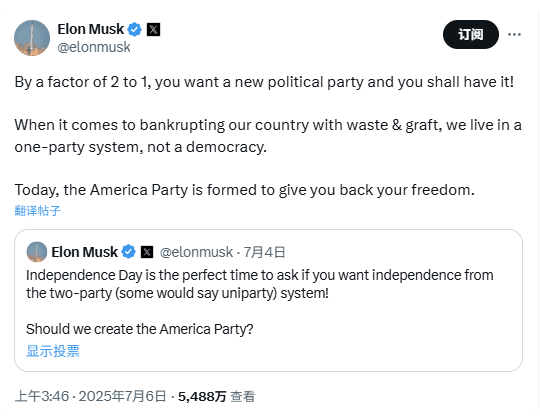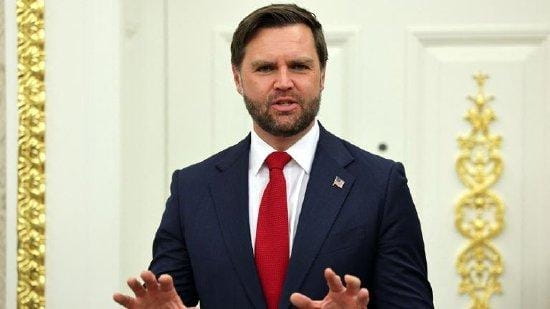According to reports, Tesla CEO Elon Musk has quietly slowed down plans to form a third party called the 'America Party.' Insiders reveal that Musk is currently more inclined to focus on running his businesses and is cautious about potentially siphoning Republican votes. At the same time, he is trying to maintain contact with U.S. Vice President J.D. Vance and is considering providing financial support in the 2028 presidential election.
As early as early July 2025, following U.S. President Donald Trump's signing of a controversial 'massive tax cut and spending bill,' Musk publicly expressed dissatisfaction. The bill has been criticized for increasing the federal deficit by trillions of dollars, and Musk has vehemently opposed it and lobbied Congress to obstruct its passage. After the bill was signed, Musk announced on social media platform X, 'Today, the America Party is officially established to restore your freedoms.' He also added, 'With a 2-to-1 ratio, if you want a new party, you will get it.' This declaration quickly drew media attention and was seen as a continuation of the rupture between Musk and Trump, who had previously referred to Musk as a 'close advisor,' but their relationship soured due to differences over fiscal policy.

Just over a month later, Musk's attitude has significantly changed. Insiders reveal that Musk has informed allies that he hopes to focus his energy on core businesses such as Tesla, SpaceX, and X. These companies are facing multiple challenges: Tesla's stock price is highly volatile, affected by global electric vehicle market competition and supply chain issues; SpaceX's Starship project is progressing well but requires massive funding to maintain; the X platform is struggling with content regulation and advertising revenue. Musk may have realized that forming a third party would not only be time-consuming and labor-intensive but could also divert resources from his business empire. More importantly, he is reluctant to 'alienate powerful Republicans,' fearing that a new party would siphon conservative votes, leading to Republican losses in the midterm elections or the 2028 election.
Musk's history of political involvement shows that he often oscillates between idealism and pragmatism. In 2024, he donated nearly $300 million to support Trump's return to the White House and was dubbed the 'shadow president' by the media. However, entering 2025, as Trump’s policies shifted, Musk's criticisms intensified, leading to public clashes between the two. Trump even threatened to reassess government contracts with Musk's companies and mocked his 'government efficiency department' as a 'monster.' Now, Musk's retreat is interpreted as a signal to repair relations with the Republican Party.
Insiders reveal that Musk has been seeking to maintain contact with Vance, who is seen as a potential heir to Trump's 'MAGA' (Make America Great Again) movement. Vance, a former Ohio senator, is known for his populist stance. He serves as Trump's campaign partner for the 2024 election and, after taking office as vice president in 2025, aims to promote technology regulatory reforms that align closely with Musk's interests. Notably, after Trump hinted earlier this month that Vance is the most likely candidate to win the next presidential election, he responded by saying he was not focused on the upcoming presidential election.
'My view on the 2028 election politics is—I haven't even focused on the 2026 election, let alone two years later,' he told reporters during a meeting with UK Foreign Secretary David Lammy.

Analysts point out that Musk's favorability has significantly declined since his political involvement. According to polls, his overall favorability has dropped to 37%, with just 6% among Republicans. 74% of respondents oppose Musk leading a third party, which may be the reality pressure behind his slowing plans.
Looking back in history, there are few successful precedents for third parties: Ross Perot's Reform Party (1992) garnered 19% of the vote but did not last; Ralph Nader's Green Party (2000) was accused of siphoning votes from the Democratic Party, leading to George W. Bush's election. Musk's 'America Party' was initially positioned to 'represent the middle 80% of voters,' emphasizing fiscal conservatism and social freedom, but lacks a concrete platform and grassroots organization. Insiders reveal that Musk's private discussions have remained at a conceptual level and have not addressed practical formation details, such as Federal Election Commission registration or state-level certification. These obstacles, coupled with high costs (forming a national party requires hundreds of millions of dollars), make the plan difficult to realize.
From a broader perspective, Musk's actions reflect the double-edged sword role of billionaires in politics. On one hand, their wealth and influence can reshape the discourse: Musk has dominated public opinion through the X platform and has pushed for discussions on cryptocurrency and AI regulation. On the other hand, public skepticism toward 'billionaire politics' is deepening. The Democrats criticize Musk for 'trying to buy the election,' while Republicans are concerned about his instability. Shifting support to Vance may be Musk's pragmatic choice: Vance has close ties with Silicon Valley moguls like Peter Thiel, who promotes the integration of technology and government through Palantir. This could bring policy benefits to Musk's companies, such as looser autonomous driving regulations or space contracts.
However, this strategy is also highly risky. As the 'MAGA heir,' Vance's populist stance may conflict with Musk's globalism. Vance has criticized big tech monopolies and supported antitrust actions, which could threaten Tesla's market dominance. Musk's business empire also faces regulatory pressures: the Federal Trade Commission is investigating X's content policies, and the Securities and Exchange Commission is scrutinizing Tesla's autonomous driving promotions. If Musk publicly supports Vance, the Democrats may seize the opportunity to attack the 'billionaire controlling the election,' further eroding his public image.
This article is for informational sharing only and does not constitute any investment advice to anyone.
Join our community to discuss this event.
Official Telegram community: t.me/aicoincn
Chat Room: Wealth Group

